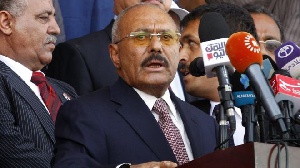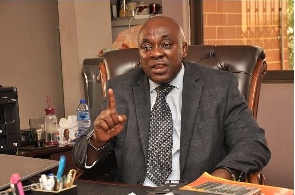 ...no politician has left a greater mark on Yemen's modern history than President Saleh.
...no politician has left a greater mark on Yemen's modern history than President Saleh.
The assassination of former President Ali Abdullah Saleh proved once again that ruling a country like Yemen is certainly not an easy task. Among those who have ruled North Yemen since the turn of the 20th century, five were assassinated and four others were forced to live in exile, including the current sitting President Abd-Rabbu Mansour Hadi - the legitimate president of the unified Yemen since February 2012.
Regardless of what others might think of his political legacy, no politician has left a greater mark on Yemen's modern history than President Saleh. He was known as a master of establishing and disbanding political coalitions, knowing correctly that no single political power can rule Yemen. Ironically, he began his political career fighting the traditional Imamate, only to have his life ended at the hands of the same forces that he had fought almost 50 years ago. His assassination comes after a short-lived alliance with the Houthis that was filled with inherent political contradictions.
The final page of President Saleh's political life has been tragically and forever turned; however, because his long political life has shaped the nature of political coalitions and governance in Yemen, his sudden assassination is likely to have its own impact on the overall trajectory of events in this war-torn country. What will happen to Yemen, and more particularly to Yemen's capital and largest city of Sanaa with a population of more than two million? Will Saleh's death prolong Yemen's current war and humanitarian crisis, or will it help bring a surprising conclusion to the conflict - either through a comprehensive military victory or through unlikely new rounds of peace negotiations and power sharing?
Will there be an uprising in Sanaa?
No doubt the Saudi Arabia-led coalition is facing increased political pressure from the international community - including international humanitarian organisations - to end its tight blockade against Yemen's sea and airports and allow for the free transportation of basic food items and medicines necessary to save the lives of vulnerable Yemeni citizens. Indeed, the spread of diseases as cholera has exacerbated the humanitarian crisis. Thus, the political divorce between Saleh and the Houthis, just 48 hours before Saleh's death, offered a glimmer of hope and a new political opportunity for the Saudi-led coalition to finally break the Houthis and end their control over Sanaa.
When Saleh announced the end of his alliance with the Houthis and called for supporters and military loyalists to undertake an uprising against the Houthis in Sanaa and other cities, it seemed that he did have a comprehensive plan to achieve this goal. Many Yemenis living under the Houthis control believed that Saleh could be the catalyst to quickly change the outcome of the military stalemate with the Houthis. However, Saleh's unexpected demise proves that a defined plan may not have existed in the first place. In the absence of such plans, it is unlikely that an uprising against the Houthis in Sanaa will be immediately forthcoming.
However, military escalation between the Houthis and Saleh's core loyalists within the Republican Special Forces may continue.
Who will succeed Saleh in the GPC?
The General People's Congress (GPC) has suffered from infighting between factions loyal to President Hadi and former President Saleh since late 2014, with Saleh maintaining considerable control over the GPC in its strongholds in and around Sanaa. Saleh also had firm control over the Republican Special Forces, which have been headed since their inception by his son, Ahmed Saleh. The immediate challenge for the GPC is what to do next and who will lead it.
Saleh's core loyalists and supporters are unlikely to forgive the Houthis for the death of their beloved leader. Yet, the question remains whether the Saleh and Hadi factions of the GPC can forge an alliance and unite the party with Yemen's formal military forces to fight the Houthis. Will the United Arab Emirates and Saudi Arabia allow Saleh's eldest son, Ahmed, to return to Yemen and play any significant role in the fight against the Houthis or perhaps in Yemen's political future? For Ahmed Saleh, the ultimate enemies are now those who killed his father and he may view avenging his father's death as trumping any political differences with the Saudi-led coalition or with Hadi's faction of the GPC.
The Houthis and Saleh's dilemma
Many within the Houthis may never have trusted Saleh and may yet hold him responsible for the death of the movement's founder, Hussein al-Houthi. Now that the Houthis have successfully eliminated Saleh from Yemen's political scene, they are poised to swiftly consolidate their political control over Sanaa if the Saudi-led coalition does not act expeditiously. The Houthis must remember, however, that they are left with no domestic alliance or partner. They can no longer blame their de facto coalition government in Sanaa for any policy failure. With Saleh's death, the Houthis will now be responsible for any deficiencies in salaries, food, or fuel in Sanaa.
Moreover, since their seizure of Sanaa more than two years ago, the Houthis have made more enemies than friends. Their list of enemies includes: President Hadi's faction of the GPC, Islah, the Mobility Movement in the south (Al-Hirak), Saleh's loyalists, al-Ahmar family, and many tribal leaders. All these Yemeni actors may have no other option than unite with the common goal of defeating the Houthis and liberating Sanaa. It remains to be seen whether the Islah party and al-Ahmar's family will forgive Saleh's family and faction and breathe new political life into the anti-Houthi forces. After all, they had been Saleh's strongest allies for more than two decades until the Yemeni uprising of 2011. Regardless of the immediate impact of Saleh's death, the war in Yemen has certainly taken an intriguing turn with the lives of more than 25 million civilians at stake.












